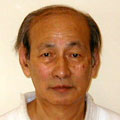
Last Update Jul-22-2001
I have been learning "AIKIDO" for nearly twenty years. The reason why I began to learn "AIDIDO" was this. In 1977, I was called upon to go to France to do research by my University for half a year and I was scheduled to teach Japanese language in the University of Lyon III for another one year in accordance with the exchange program. I thought it wouldn't make any sense to teach only a language because language is a part of culture of the country where it is spoken. I'd better teach something authentically Japanese as well as Japanese language. So I decided on "AIKIDO" before leaving Japan.
AIKIIDO is not only a Japanese martial art. It is more metaphysical, more religious and more spiritual than Judo, though both of them are derived from classical Jujutsu, a self-defense art of old days. It is an art of the way of controlling another by being in harmony with him/her. This may sound very paradoxical, but I have realized these days after having practiced it for a long time that this traditional Japanese martial art is worth learning and we can be proud of it at this time of regional wars, racial prejudice and discrimination.
You may ever seen a picture entitled the "Birth of Venus" painted by Botticelli, an Italian painter of the Renaissance Era. In it, a man and a woman are flying in the sky and one of them is blowing a breath to Venus, goddess of fertility in Greek mythology. This painting symbolizes what breath means. In Japanese, breath is "KI" which is written  in Chinese character which means steaming cooked rice
in Chinese character which means steaming cooked rice![]() , the essential one giving us potential living energy.
, the essential one giving us potential living energy.
In our daily life, we Japanese often use "ki": "ki-mochi"(feeling), "ki-kubari"(to be thoughtful of), "ki-nikakeru"(to pay attention to), "ki-niyamu"(to take something ill), "ki-gaarai"(to have a violent temper) and so on.
You may have heard of the name of Father Sauveur Candeau, Catholic missionary priest and a former Professor at Sophia University as well as a founder of Tokyo Catholic Seminary. He was born in the Basque region, a mountainous country between France and Spain. He graduated from Gregorian University in Rome. As is the case of almost all seminarians, he was very good at classical languages such as Latin and Greek. Moreover, he was competent in spoken Japanese with rich knowledge of not only Japanese but also Chinese classics. Every time I attended his lecture both at Athénée Français at Ochanomizu and at Institut Franco-Japonais at Iidabashi, I respected his rich knowledge of both western classics and Japanese classics based upon Chinese classics. As a matter of fact, he spoke splendid, awesome Japanese based on his erudite scholarship of classical Japanese and Chinese cultures.
In fact, when he first came to Japan, he chose Shizuoka City to settle down in, because he thought he could study Nine Chinese classics like the Analects of Confucius and others with Professor Kinzo Murakoshi, scholar of Chinese classics. So his Japanese became perfect and unparallel. He wrote essays in excellent Japanese full of elegant euphemism in a column of the Asahi Newspaper and no Japanese who met him could ever forget his prestigious personality and profound academic background.
But one day I was quite astonished when I read his essay in the Asahi that it had been impossible for him to understand "KI " deeply rooted in Japanese characteristics like in "ki wa kokoro"(literally "Spirit is mind".) What is "KI"? he wondered and wondered, thought and thought consulting Japanese dictionaries and scholars, but he finally gave up.
" deeply rooted in Japanese characteristics like in "ki wa kokoro"(literally "Spirit is mind".) What is "KI"? he wondered and wondered, thought and thought consulting Japanese dictionaries and scholars, but he finally gave up.
Though vaguely, all Japanese understand what "KI" is. And we can realize that there is "KI" flowing here and there: even among men and men, women and men, women and women and even among the universe and the human beings. Then I noticed in a nutshell that by practicing "AIKIDO" day after day, we can perceive some day, though it might be tiny at first stage, the stream of "KI".
Last but not least: there are some companies that have Aikido Clubs and by training the spirit of Company employees with it, they are recording more dynamic achievements. What do you think of boiling up the spirit of those Japanese youngsters who are loosing their vitality, by making them learn "AIKIDO"? This is my dream.
Contact : RAKUSHINKAN